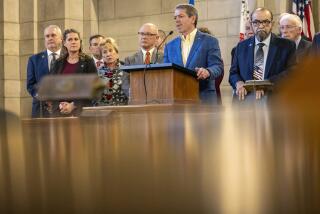Government farm subsidies help make Americans fat, researchers say
Agricultural subsidies are contributing to the obesity epidemic in the U.S. and should be revised to help improve public health, Canadian researchers say.
Agriculture policy “remains largely uninformed by public health discourse,” they write in an article published Tuesday in the American Journal of Preventive Medicine.
Government farm subsidies have helped create an inexpensive food supply with the sorts of foods that lead to obesity, they said. That’s a position about which there is a great deal of contention, with some arguing that inexpensive commodity prices do not do much to reduce retail prices; and that other countries with high subsidies do not have high obesity rates.
Congress is grappling with a five-year, $500-billion farm bill. In June, the House rejected it; Republicans complained it did not cut enough from food stamps, which are also part of the legislation as well as school food and other programs.
The U.S. food market provides 3,900 calories a day per person – about twice what a person needs, according to the government. Consumption has increased by 38% in added fats from 1970 to 2000, and by 1,000% in high fructose corn syrup from 1970 to 1990, the researchers wrote.
“American farm policy is effectively driving the production and propagation of cheap sugars and oils that lead to widespread weight gain,” said the researchers from McGill University. In 2004, they said, 96% of U.S. cropland was dominated by eight crops: corn, soy, wheat and rice among them.
Subsidies, including direct payment to farmers, in 2010 totaled more than $15 billion, aimed at protecting farmers from risk and ensuring stability. The researchers noted that there is little support for those who grow fruits and vegetables, making that choice a risky one.
“[G]overnment and public health activists should support policies that help disincentivize monocultural overproduction, not policies that fuel it,” wrote the researchers, led by Dr. Mark Eisenberg.
Many people fail to consider unseen costs of cheap food, including taxes paid to support farms and healthcare costs associated with unhealthful diet choices, the researchers said.
They acknowledged that the problem of obesity is complicated and has many contributing factors.
@mmacvean on Twitter







